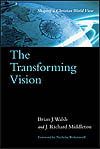Scholarship: Seeing and Savoring God in Every Branch of Learning
The task of Christian scholarship is to study reality as a
manifestation of God’s glory, to speak about it with
speak about it with
accuracy and to savor the beauty of God in it.
I think Edwards would regard it as a massive abdication of scholarship that so many Christians do academic work with so little reference to God. If tall the universe and everything in it exists by the design of an infinite, personal God, to make His manifold glory known and loved, then to treat any subject without reference to God’s glory is not scholarship, but insurrection.
John Piper
God’s Passion for His Glory
Oh, my, what a privilege to try to remind scholars (and other ordinary folks) of this, to remind myself, too, that the reason we sell books on so many topics—from engineering to political science, from family studies to geology, from liturgical studies and worship to race relations and multi-ethnic ministry—is so that God might be glorified in all these vast and varied arenas of life.
This week I got to tell our story, once again, about our vision of having a bookstore that equips people to think seriously about life, to read widely, finding books that “warm the heart and stimulate the mind” that help us become leaders in social innovations and lives of integrity. We are serious about the call of the Bible to “take every thought captive” and to have non-conformed minds, “renewed minds” as Romans 12:1-2 puts it. So, again, I drove a van-load of book, this time to the fabulous CCO Christian fellowship group at the University of Pittsburgh, sharing with 130 some under grads, talking about why buying books and thinking well is the way to a more meaningful college education and a more faithful Christian style of discipleship. We cited to these students some of our favs (which I hope you don’t grow tired of me naming) like Os Guinness’ The Call and Don Opitz & Derek Melleby’s The Outrageous Idea of Academic Faithfulness and Andy Crouch’s Culture Making and others who invite us to think seriously about the foundational questions of a Christian way of being in the world.
 The Transforming Vision by Brian Walsh & Richard Middleton has a new cover and we still think it to be one of the most important books I’ve ever read. (Brian’s new one, Beyond Homelessness:Christian Faith in a Culture of Displacement, is another we’ve raved about!) The lovely little hardback The Mind of God by James White is another example of the way habits of reading can help us know God better and serve Christ more faithfully in the real world of daily living. I often cited in these settings Steve Garber’s Fabric of Faithfulness: Weaving Together Believe and Behavior, an elegant and thoughtful book that emerged from Steve’s own work years ago in that same university complex. Garber identified three things that those with serious faith commitments need if their discipleship will be meaningful and sustained; we talked about those three things the last few nights. Thanks to Chris and his “Cornerstone” team for a great night.
The Transforming Vision by Brian Walsh & Richard Middleton has a new cover and we still think it to be one of the most important books I’ve ever read. (Brian’s new one, Beyond Homelessness:Christian Faith in a Culture of Displacement, is another we’ve raved about!) The lovely little hardback The Mind of God by James White is another example of the way habits of reading can help us know God better and serve Christ more faithfully in the real world of daily living. I often cited in these settings Steve Garber’s Fabric of Faithfulness: Weaving Together Believe and Behavior, an elegant and thoughtful book that emerged from Steve’s own work years ago in that same university complex. Garber identified three things that those with serious faith commitments need if their discipleship will be meaningful and sustained; we talked about those three things the last few nights. Thanks to Chris and his “Cornerstone” team for a great night.
The next day, I had the immense privilege to share this same vision with a group of Pitt and CMU grad students, a few Ph.D. candidates, faculty and professors, a few law students and med students. And a whole batch of very sharp post-college work-world professionals. We struggled with big questions, how the goodness of God’s world, distorted by cursedness and sin, can be healed and renewed by Christian folk serving as God’s agents of restoration. What difference does it make, we asked, for people of faith to reject the dualism or secularity of our times, and boldly invite Christ into our marketplace vocations, our office cubicles, research labs, or job sites. Of course we talked about the secularization of the university, George Marsden’s little Oxford book The Outrageous Idea of Christian Scholarship and, for the post-college crowd, resources such as Your Work Matters to God by Doug Sherman & William Hendricks.
I talked with a guy working with “thinking machines” who is designing “smart wheelchairs” and I talked with an insurance agent. There were chemistry Ph.D. researchers and social workers doing urban ministry and a specialist in international economics. A pacifist and an Air Force pilot had respectful conversation. How do our Christian convictions impact these fields?
Can I suggest books that guide them more deeply into the journey of work-world fidelity?
Can Christians even in seemingly arcane fields like mechanical engineering or robotics or mathematics find God’s glory and see their work as an avenue of God-honoring, neighbor-loving, service? We can, as Parker Palmer reminds us in his beautiful Let Your Life Speak, help make the world a better place by “listening to the voice of vocation.” Which should lead to some Curious George-like attributes, as was recently written over at Academicfaithfulness.com.
help make the world a better place by “listening to the voice of vocation.” Which should lead to some Curious George-like attributes, as was recently written over at Academicfaithfulness.com.
Thanks to Mitch from Bellefield Presbyterian Church for not only hosting our book show, but by introducing me using this splendid quote shown above by John Piper whose book God’s Passion for His Glory (Crossway; $15.99) is a vast and warm and profound reflection on what some consider to be the most important sermon of Jonathan Edwards.
Interestingly, I intended to draw upon John Piper, from his great chapter “Serving God in the 9-to-5” in his Don’t Waste Your Life where he reflects on the difference between human work and the work done by, say, a beaver, who also works studiously. Piper reminds us that our labor, if it is to glorify God and be laden with meaning and not “wasted”, must be aware of four things: we do our work for God’s glory, using and acknowledging gifts and talents God gives us, studying and being in submission to the creational realities that are there, done in service to our neighbor. I like that, our work is for God and neighbor, done in and through Him, but, importantly, also studying the creation, and submitting ourselves to the “laws” or “norms” embedded in reality. Or, as Piper says above, “speaking about it with accuracy.”
Piper, citing Edwards, in the opening quote above, is correct also about this: to not study all areas of God’s world is an abdication of our cultural mandate. To fail to see God in each spher
e of life is to steal from Him His glory. And to fail to see God in the details of life we end up, finally, warping the meaning and potentials of that arena, of that aspect of culture, and thereby keep it from truly helping our world, truly serving our neighbor. Just was blunt, we are to love God and neighbor. Hopefully, our bookish work here reminds people of how to make that happen, in the ordinary stuff of daily life, and especially, in our work, callings and careers. We think our book selection, being a bit different than more typical “Christian bookstores” offers a broader range of resources to help live into this grand Edwardsian vision about ordinary work. We think we can help you learn more of how to know God and enjoy serving Him in the real world.
Thanks to the young professionals, the campus ministry teams and the good folks at Bellefield Presbyterian and the CCO who allowed us to sell books and preach about all this life changing stuff out at Pitt. It is our partnership with lively and relevant congregations and ministries that allow us to stay in business, doing this kind of resourcing work. I didn’t get back home, after driving all night, and sleeping a bit along the road, until 6 am, but was worth every minute.
Want to help keep this conversation going among your church, fellowship, friends or work-world colleagues? Do you long for more discussion about this stuff?
Choose any of the books I’ve mentioned in passing above and we’ll give you a 20% discount. Over at the website you can inquire about prices or other details or you can just order a few. To order, go here. We thank you very much.

Byron – your passion and ministry of teaching us how to think biblically is so important and valuable. thank you from all of us a Bellefield Presbyterian Church/CCO staff at BPC for coming our way. You left us with lots of consider! (sorry to hear you didn’t get home until 6am!)
In Christ,
– Mitch
ps. I’m going to make sure all who attended get a chance to read your recent blog post!
I’ve been blessed by your blessings. Keep up the good work.
glad you’re speaking to college groups, byron. keep up the good work.
sam
Cheers for writing about this. FYI – here’s some more info about office cubicles you might like!